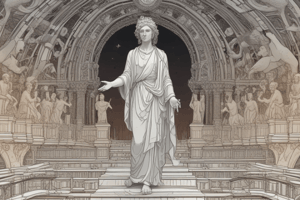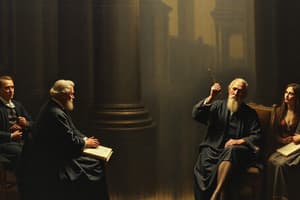Podcast
Questions and Answers
What is A Theory of Justice?
What is A Theory of Justice?
- A novel
- A scientific theory
- A self-help book
- A work of political philosophy and ethics (correct)
What problem does Rawls address in A Theory of Justice?
What problem does Rawls address in A Theory of Justice?
- The problem of distributive justice (correct)
- The problem of free will
- The problem of morality
- The problem of consciousness
What is Rawls' alternative moral theory based on?
What is Rawls' alternative moral theory based on?
- Plato's philosophy
- Aristotle's philosophy
- An updated form of Kantian philosophy and a variant form of conventional social contract theory (correct)
- Nietzsche's philosophy
What are the two central principles of justice offered by Rawls?
What are the two central principles of justice offered by Rawls?
What is the original position proposed by Rawls?
What is the original position proposed by Rawls?
What is the maximin strategy proposed by Rawls?
What is the maximin strategy proposed by Rawls?
What are Rawls' two principles of justice?
What are Rawls' two principles of justice?
What is a criticism of Rawls' theory of justice?
What is a criticism of Rawls' theory of justice?
What is the impact of Rawls' work on political philosophy?
What is the impact of Rawls' work on political philosophy?
Flashcards
Rawls' View of Justice
Rawls' View of Justice
Justice as fairness; society distributes benefits/burdens fairly.
Rawls' First Principle
Rawls' First Principle
Society structured so that the greatest possible amount of liberty is given to its members.
Rawls' Second Principle
Rawls' Second Principle
Inequalities are allowed only if they benefit the worst off under an equal distribution.
Original Position
Original Position
Signup and view all the flashcards
Veil of Ignorance
Veil of Ignorance
Signup and view all the flashcards
Maximin Strategy
Maximin Strategy
Signup and view all the flashcards
Equal Liberty Principle
Equal Liberty Principle
Signup and view all the flashcards
Difference Principle
Difference Principle
Signup and view all the flashcards
Equal Opportunity Principle
Equal Opportunity Principle
Signup and view all the flashcards
Study Notes
A Theory of Justice by John Rawls
-
A Theory of Justice is a 1971 work of political philosophy and ethics by philosopher John Rawls.
-
Rawls provides an alternative moral theory to utilitarianism and addresses the problem of distributive justice.
-
Rawls uses an updated form of Kantian philosophy and a variant form of conventional social contract theory.
-
The theory is a political theory of justice that offers two central principles for discussion of justice.
-
The first principle dictates that society should be structured so that the greatest possible amount of liberty is given to its members.
-
The second principle permits inequalities only if the worst off will be better off than they might be under an equal distribution.
-
Rawls developed the two central principles in the 1985 essay "Justice as Fairness" and the 2001 book Justice as Fairness: A Restatement.
-
Rawls' theory of justice is based on the original position, which is an artificial device that blinds people to all facts about themselves so they cannot tailor principles to their own advantage.
-
Rawls believes that those in the original position would all adopt a maximin strategy which would maximize the prospects of the least well-off.
-
Rawls' two principles of justice are the greatest equal liberty principle, the difference principle, and the equal opportunity principle.
-
A Theory of Justice has been criticized by several philosophers, including Robert Nozick, Allan Bloom, Michael Sandel, and Charles W. Mills.
-
Amartya Sen has raised concerns over Rawls' emphasis on primary social goods, arguing that we should attend not only to the distribution of primary goods but also how effectively people are able to use those goods to pursue their ends.Critiques of Rawls' Theory of Justice
-
Rawls underestimates the difficulty of getting society to comply with just norms.
-
Rawls’ idea that there be only one possible outcome of the reflective equilibrium behind the veil of ignorance is misguided.
-
Sen believes that multiple conflicting, yet just, principles may arise, undermining Rawls’ multistep process to achieve a perfectly just society.
-
A Theory of Justice inspired a musical in 2013 called A Theory of Justice: The Musical!.
-
Rawls is one of the most influential political philosophers of the 20th century.
-
Rawls argues that justice is fairness and that a just society is one that distributes its benefits and burdens fairly.
-
Rawls’ two principles of justice are the difference principle and the principle of equal basic liberties.
-
Rawls proposes the original position and the veil of ignorance as thought experiments to determine just principles of distribution.
-
Rawls’ theory of justice has been criticized for its lack of attention to issues of race, gender, and ability.
-
Critics argue that Rawls’ theory is overly idealistic and impractical, and that it fails to address the realities of power and inequality in society.
-
Rawls’ work has had a significant impact on political philosophy, and his ideas continue to be debated and discussed today.
-
Other prominent political philosophers, such as Martha Nussbaum and Amartya Sen, have built on Rawls’ work to develop alternative theories of justice.
Studying That Suits You
Use AI to generate personalized quizzes and flashcards to suit your learning preferences.




